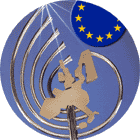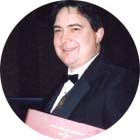
|
|
|
||
|
European Championships: A closer look at Carl Rutti's magnificent test piece, Robert Childs and the Welsh band that hopes to do the treble. Buy As You View Cory Band Montreux Wind Dances: Carl Rutti Whoever at the European Brass Band Association made the decision to ask Carl Rutti to compose the test piece for the 2001 Championships should be made to get up on the stage and accept the grateful thanks of all bandsmen and women around Europe – for his “Montreux Wind Dances” is a quite brilliantly realised piece of musical composition. We at 4BarsRest may not like everything the EBBA are doing, but this is one of the best things they have ever done. Broken into three distinct movements – fast, slow, fast – it is an amazing collage of colours, timbres and textures interwoven with subtlety and wit – a million miles away from the run of mill test pieces most top class bandsmen get to perform year in year out. Not only will this root out the very top class bands from the rest of the field, the piece will give pleasure and satisfaction to listener. The first section is entitled “Tree Dances” and evokes pictures of gently swaying trees that progressively move, bend and change shape as the tempo and complexity of the scoring increases. The start is very (and I mean) very quiet with sparse chords linked to the vibraphone and marimba, before the first of many subtle motifs appear in reels of notes that imperceptibly change over the course of the movement. It’s sparse and minimalist and quite beautiful, with a lovely cornet solo, which is surrounded by echoes of birdsong. A notable feature throughout the piece is the composer’s deliberate instruction to the conductor to “realise” the colours, shapes and textures for themselves, so that the music is just not an interpretation of tempo and style but of the subtleties of music making. This will catch a lot of bands out. The second section is entitled “Lake Dances” and is perhaps musically the most challenging section. Again it is the colours and timbres that impress, even though the technical challenges are difficult enough and reminds you of the music of Elgar Howarth. A lovely languid trombone solo is repeated up to four times throughout the band, but it is the underscoring of tapered motifs that accompany this that is so beautifully realised. The composer invites the conductor to realise his picture of a stone being dropped into a lake with the resultant ripples moving out from the centre before finally disappearing. It’s an idea that requires the conductor to employ intelligence and musical thought – the tam tam is used to amazing effect with different beaters for instance and the section is quite hypnotically atmospheric. The last section is the one that technically will sort the men from the boys – the “Fire Dance”. Minim = 132 beats per minute – that’s 264 crotchets to you and me and is reading that is off your average metronome. To makes matters worse, there are 250 bars in the movement and 238 time signature changes. Complex or what? However, it’s the music that comes shining through and not the technical pyrotechnics. The moving motifs are apparent and again change very imperceptibly so that by the end of the piece everything has literally turned full circle – the chords at the very beginning are heard again at the end. There is super use of the percussion section throughout, but it compliments and does not overpower, whilst individual players parts speak clearly even though the dynamic level is loud. It is exciting, vivacious and very nearly wild, but it is always intelligent. We should be hoping that Mr Rutti can be persuaded to write more for brass bands in the future. Well done the EBBA and we hope everyone at the Stravinsky Hall enjoy the piece as much as we did. The Buy As You View Cory Band was originally formed in 1884 as The Ton Temperance Band, holding their rehearsals in the village of Ton Pentre in the Rhondda Valley South Wales, where the band is still based. During 1895 the band were engaged to play at the opening of the colliery library and so impressed the chairman of the mine owners, Sir Clifford Cory, that he offered to provide assistance and to find suitable employment for a first class conductor. Hence the famous name of the Cory Workman's Band was formed. In 1920 the band attained championship status and three years later achieved the distinction of performing what is believed to be the first radio broadcast by a brass band from the studio in Cardiff of the newly formed Radio Broadcasting Company in Wales. Throughout the 20th Century the band achieved significant success in the brass band contesting field. In 1948 the band were runners-up at the National Championships of Great Britain and in 1950 the band were runners-up again, this time at the most prestigious contest of them all - The British Open. On both occasions the legendary Walter Hargreaves conducted the band. The 1970's saw a return to contest success at the highest level with the band being placed third at the 1971 National Finals and third at the 1972 British Open under the baton of Major Arthur Kenney. In 1974 however, the band created history in becoming the first Welsh band to take the National title back to the Principality when they took the title with the "Major" at the helm. A significant honour bestowed on the band during 1976, was to represent the Great Britain Brass Band Movement at the bicentennial celebrations in the USA. During the historic tour the band performed over twenty concerts in such venues as The United Nations Building and the Kennedy Centre in Washington. In 1979 the band once again were runners-up at the National Finals, this time under the direction of Denzil Stephens, who also had the honour of steering the band to winning the 1980 European Brass Band Championships. The return of Major Kenney saw the band complete an amazing hat-trick of wins at the National Finals in 1982, 1983 and 1984 - the latter title won in their centenary year. The band continued to be consistent challengers for the top contesting honours in the following period, but it was with the appointment of Robert Childs that the band reached it's culmination of success in the year 2000, when the band became the first Welsh band in the 148 year history of the British Open Championships to win the coveted Shield and be crowned "British Open Champions." Not content with this achievement, the band reclaimed the title of National Champion Band of Great Britain at the Royal Albert Hall in the October of last year and became historic "Double Champions". 2001 also saw the band become Brass Band in Residence at the Welsh College of Music and Drama - working development that allows them to pass on some of their experience to talented young musicians throughout the Principality. The Cory Band had been self-supporting for many years, relying
on income from concerts and competitions together with funds raised
by a ladies committee. However, during 1998, Just Rentals a locally
based company agreed to support the band resulting in it becoming
known as the "Just Rentals" Cory Band. Resulting from expansion
of the sponsor company and a change in their name to reflect the
developments in their business in 1999 the band became known as
the "Buy As You View" Cory Band. The enthusiastic and committed
sponsorship has seen the band carry the company name to the forefront
of brass banding in the UK and it proudly bears their name as Welsh
representatives at this year's European Championships in Montreux
in Switzerland, the 13th time they have had the honour since the
inception of the contest in 1978. Professional Music Director:Robert B Childs M.Mus dist. A.R.C.M. (hons) F.L.C.M. P.G.C.E. Robert Childs is an Associate of the Royal College of Music, a Fellow of the London College of Music, and has gained a distinction in a Master's Degree from the University of Leeds. He also holds a Post Graduate Certificate in Education from the Open University and is currently on a Doctoral programme at the University of Salford. He is Director of Brass Band Studies at the Welsh College of Music and Drama, Cardiff, Professor of Euphonium at The Royal Northern College of Music and The University of Leeds, where he also conducts the University Brass Band. Robert is a tutor and council member to the National Youth Brass Bands of Great Britain and Wales and is also a council member of the National Youth Wind Orchestra of Great Britain. He is also an experienced record producer and Director of Doyen Recordings. He began learning the euphonium at the age of seven under the guidance of his father John Childs. Robert also took lessons at an early age with Mr Ivor Powell, conductor of the Tredegar Youth Band. After a short spell with The Crosskeys Silver Band he joined The Tredegar Town Band and soon became their Solo Euphonium player, leaving in 1976 to join the GUS (Kettering) Band. Subsequently Robert has been a member of The Grimethorpe Band, The Hammond Sauce Works Band, The Yorkshire Imperial Metals Band, The Brighouse and Rastrick Band and The Black Dyke Mills Band. Robert conducted and performed with the Yorkshire based Black Dyke Band for almost ten years and conducted them on several important occasions, including performances with Susanna Walton, Lesley Garret, Philip Smith and The Beautiful South pop group and he has performed with many of the UK's leading professional orchestras. As a clinician for Boosey and Hawkes Musical Instruments he regularly gives solo recitals in prestigious halls at home and abroad, he has performed in Carnegie Hall, The Royal Albert Hall, The Grieg Hall, The Royal Festival Hall and Sydney Opera House. He frequently delivers Master Classes at many Universities at home and abroad. He recently gave the World Premier performance of Elgar Howarth's new Euphonium Concerto, 'Stories for Saroyan'. In May last year Robert was delighted to accept the invitation to become the Professional Music Director of the 'Buy As You View Cory Band' from the Rhondda in South Wales, re-uniting him with his homeland and associating him with the band he had held in such high esteem since his youth. In a short space of time he has revitalised brass banding in Wales by steering his new band to an historic 'Double' - winning both the British Open and the National Championships of Gt. Britain in the year 2000 - the former being a title that had eluded Welsh bands for 148 years. Robert is part of a very musical family; both his children Lisa and David are studying at The Royal Academy of Music, London and the Royal Northern College of Music, Manchester, whilst his wife, Lorraine, plays flugel horn with the Hull based EYMS Band. Both his sisters, Sandra and Melanie are involved in band music and his brother Nicholas needs no introduction to anyone in the music business, being the Music Director of the Black Dyke Band and Managing Director of Doyen Recordings as well as being personal adviser to his older brother Robert!! |
|
|



